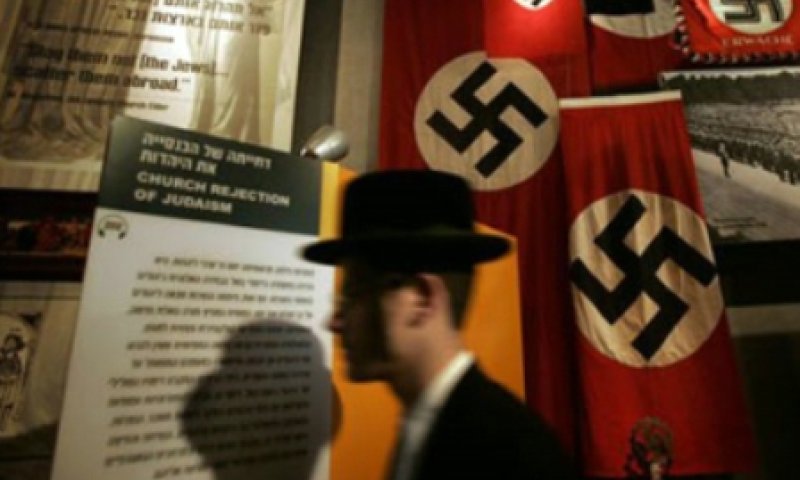
Canadian judge: "burn the Jewess" - not hate crime
After three years, the judge ruled: "torching of Jewish girl's hair while saying 'Let's burn the Jew' is not motivated by racism" • Rage in Bnei Brit
- Yoel Bittleman, Behadrey Haredim
- י"ב שבט התשע"ד

Illustration photo
"The catching of a Jewish school girl in school, lighting a lighter near her hair and setting it on fire while saying "let's burn the Jew" are not motivated by racism" – according to the ruling this week by Supreme Court judge in Winnipeg on an event that happened at school three years ago, when a boy lit the hair of a girl with a cigarette lighter, while calling his friends and saying "let's burn the Jew."
The lawyer of the attacking student, who is now 17, claimed that the boy was not about to set fire to the girl's hair, but the girl moved while the lighter was alight. The lawyer did not deny the sentence which his client said "let's burn the Jew" but argued that the word "Jew" was not said by way of insult or humiliation, rather was a common expression in school and the defendant was not the only one who used it.
He admitted that his client was a bully, but claimed that the event was impulsive and unplanned. Although the boy admitted that he behaved as a bully, the judge Robert Finleison, accepted the defense's arguments cleared the attacker of a hate crime.
The boy attacker was convicted of assault using a weapon, and he was sentenced to 18 months of probation, and sent for counseling, was required to write a letter of apology to the Jewish student and perform 75 hours of community work.
At the court hearing, the Jewish student said that the attack changed her life drastically, and that she had to get counseling to deal with her anxieties. She also noted that school students accused her of making a big splash story.
The B'nai Brith Canada organization commented on the decision: "This decision is disappointing, with no logic in light of the facts of this serious event which took place at a school," said Frank Diamant, CEO of the organization.
He said the court decision was lenient in the interpretation of the law that deals with hate crime and "grants license to those who express a message of hate and take the way of bullying, particularly in the education system."
Diamant argued that by the very act of the attack through a burning lighter and the saying "Let's burn the Jew", the attacker expressed hostility and a message of inspiration to anti-Semitism. "The arguments of the defense and the judge do not teach understanding of the meaning of hatred, which is an emotion, and like any other emotion it is expressed in an impulsive and unplanned action."
The lawyer of the attacking student, who is now 17, claimed that the boy was not about to set fire to the girl's hair, but the girl moved while the lighter was alight. The lawyer did not deny the sentence which his client said "let's burn the Jew" but argued that the word "Jew" was not said by way of insult or humiliation, rather was a common expression in school and the defendant was not the only one who used it.
He admitted that his client was a bully, but claimed that the event was impulsive and unplanned. Although the boy admitted that he behaved as a bully, the judge Robert Finleison, accepted the defense's arguments cleared the attacker of a hate crime.
The boy attacker was convicted of assault using a weapon, and he was sentenced to 18 months of probation, and sent for counseling, was required to write a letter of apology to the Jewish student and perform 75 hours of community work.
At the court hearing, the Jewish student said that the attack changed her life drastically, and that she had to get counseling to deal with her anxieties. She also noted that school students accused her of making a big splash story.
The B'nai Brith Canada organization commented on the decision: "This decision is disappointing, with no logic in light of the facts of this serious event which took place at a school," said Frank Diamant, CEO of the organization.
He said the court decision was lenient in the interpretation of the law that deals with hate crime and "grants license to those who express a message of hate and take the way of bullying, particularly in the education system."
Diamant argued that by the very act of the attack through a burning lighter and the saying "Let's burn the Jew", the attacker expressed hostility and a message of inspiration to anti-Semitism. "The arguments of the defense and the judge do not teach understanding of the meaning of hatred, which is an emotion, and like any other emotion it is expressed in an impulsive and unplanned action."
תגובות
{{ comment.number }}.
הגב לתגובה זו
{{ comment.date_parsed }}
{{ comment.num_likes }}
{{ comment.num_dislikes }}
{{ reply.date_parsed }}
{{ reply.num_likes }}
{{ reply.num_dislikes }}



הוספת תגובה
לכתבה זו טרם התפרסמו תגובות